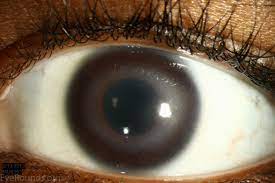Ocular Cogan Syndrome (OCS) is a rare autoimmune disorder that affects the eyes and other organs of the body. It is characterized by inflammation of the blood vessels in the eyes, which can lead to various eye-related symptoms such as redness, pain, and sensitivity to light. OCS is often associated with a wider range of symptoms such as fever, fatigue, joint pain, and inflammation of the inner ear.
The exact cause of Ocular Cogan Syndrome is not known, but it is believed to be an autoimmune disorder, where the immune system attacks the body’s own tissues. The disease may be triggered by a viral or bacterial infection, but there is no definitive evidence to support this theory. Certain genetic factors may also play a role in the development of OCS.
The symptoms of Ocular Cogan Syndrome can vary from person to person, and the severity of symptoms can also vary over time. The most common symptoms of OCS include eye pain and redness, photophobia (sensitivity to light), blurred vision or loss of vision, tearing or watery eyes, foreign body sensation, swelling of the eyes or eyelids and double vision
In addition to these eye-related symptoms, patients with OCS may also experience systemic symptoms such as fever, fatigue, joint pain, and inflammation of the inner ear. These symptoms may occur before, during, or after the onset of eye symptoms.
The diagnosis of Ocular Cogan Syndrome is made based on the presence of characteristic symptoms, a detailed medical history, and physical examination. The doctor may also perform various tests such as blood tests, imaging tests, and biopsy to rule out other possible causes of the symptoms.
The treatment of Ocular Cogan Syndrome depends on the severity of symptoms and the extent of organ involvement. The primary goal of treatment is to control the inflammation and prevent further damage to the eyes and other organs. The treatment may include:
Corticosteroids: These drugs are often used to reduce inflammation and are usually given in high doses at the onset of the disease.
Immunosuppressants: These drugs are used to suppress the immune system and reduce inflammation. They are often used in combination with corticosteroids to maintain remission.
Anti-inflammatory drugs: These drugs may be used to reduce inflammation in the eyes.
Surgery: In some cases, surgery may be required to correct vision problems such as cataracts or glaucoma.
The prognosis for Ocular Cogan Syndrome varies depending on the severity of the disease and the extent of organ involvement. Early diagnosis and treatment can help prevent permanent vision loss and other complications. However, in some cases, the disease may progress despite treatment, leading to permanent damage to the eyes and other organs.
In conclusion, Ocular Cogan Syndrome is a rare autoimmune disorder that affects the eyes and other organs of the body. The disease can cause various eye-related symptoms such as redness, pain, and sensitivity to light. It is important to seek prompt medical attention if you experience any of these symptoms, as early diagnosis and treatment can help prevent permanent damage to the eyes and other organs. If you have been diagnosed with OCS, it is important to work closely with your doctor to develop a treatment plan that is tailored to your individual needs.
At The Eye Center- Dr. Mahnaz Naveed Shah & Associates our team of eight ophthalmology subspecialists/ eye specialists, eye surgeons who are considered amongst the very best eye specialists in Karachi and in Pakistan, have the diagnostic and treatment capabilities to treat from the simplest to the most complex patients. We work hard to provide our patients with the best possible medical and surgical eye care, in a state of the art purpose built eye care facility. We offer the entire array of medical, laser and surgical treatments to help provide patients the best possible care in the most efficient, safe and ethical manner.
If you need an appointment, please contact us at 03041119544 during our working hours or leave us a WhatsApp message at +923028291799 and someone will connect with you. Walk-in appointments are also available for emergencies. We can also be reached through our web portal on www.surgicaleyecenter.org


